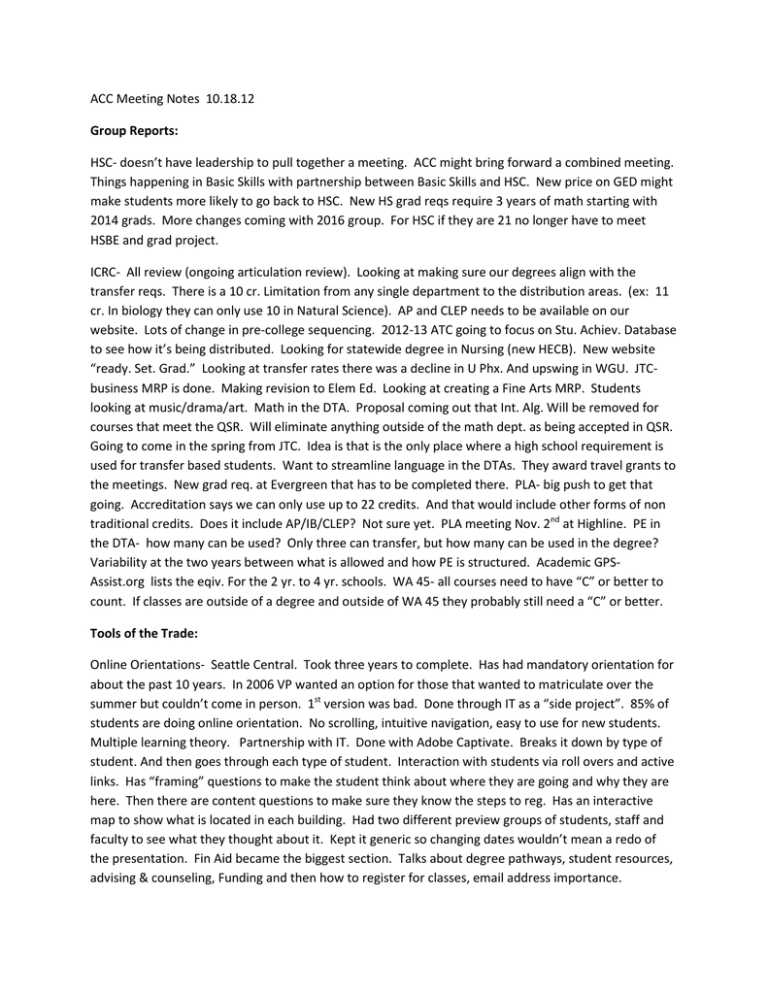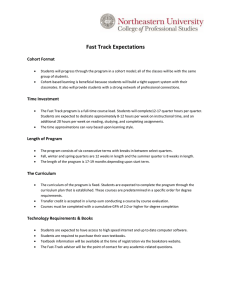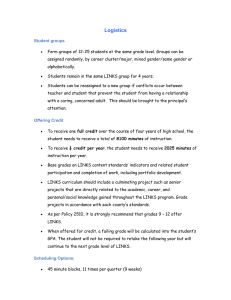ACC Meeting Notes 10.18.12 Group Reports:
advertisement

ACC Meeting Notes 10.18.12 Group Reports: HSC- doesn’t have leadership to pull together a meeting. ACC might bring forward a combined meeting. Things happening in Basic Skills with partnership between Basic Skills and HSC. New price on GED might make students more likely to go back to HSC. New HS grad reqs require 3 years of math starting with 2014 grads. More changes coming with 2016 group. For HSC if they are 21 no longer have to meet HSBE and grad project. ICRC- All review (ongoing articulation review). Looking at making sure our degrees align with the transfer reqs. There is a 10 cr. Limitation from any single department to the distribution areas. (ex: 11 cr. In biology they can only use 10 in Natural Science). AP and CLEP needs to be available on our website. Lots of change in pre-college sequencing. 2012-13 ATC going to focus on Stu. Achiev. Database to see how it’s being distributed. Looking for statewide degree in Nursing (new HECB). New website “ready. Set. Grad.” Looking at transfer rates there was a decline in U Phx. And upswing in WGU. JTCbusiness MRP is done. Making revision to Elem Ed. Looking at creating a Fine Arts MRP. Students looking at music/drama/art. Math in the DTA. Proposal coming out that Int. Alg. Will be removed for courses that meet the QSR. Will eliminate anything outside of the math dept. as being accepted in QSR. Going to come in the spring from JTC. Idea is that is the only place where a high school requirement is used for transfer based students. Want to streamline language in the DTAs. They award travel grants to the meetings. New grad req. at Evergreen that has to be completed there. PLA- big push to get that going. Accreditation says we can only use up to 22 credits. And that would include other forms of non traditional credits. Does it include AP/IB/CLEP? Not sure yet. PLA meeting Nov. 2nd at Highline. PE in the DTA- how many can be used? Only three can transfer, but how many can be used in the degree? Variability at the two years between what is allowed and how PE is structured. Academic GPSAssist.org lists the eqiv. For the 2 yr. to 4 yr. schools. WA 45- all courses need to have “C” or better to count. If classes are outside of a degree and outside of WA 45 they probably still need a “C” or better. Tools of the Trade: Online Orientations- Seattle Central. Took three years to complete. Has had mandatory orientation for about the past 10 years. In 2006 VP wanted an option for those that wanted to matriculate over the summer but couldn’t come in person. 1st version was bad. Done through IT as a “side project”. 85% of students are doing online orientation. No scrolling, intuitive navigation, easy to use for new students. Multiple learning theory. Partnership with IT. Done with Adobe Captivate. Breaks it down by type of student. And then goes through each type of student. Interaction with students via roll overs and active links. Has “framing” questions to make the student think about where they are going and why they are here. Then there are content questions to make sure they know the steps to reg. Has an interactive map to show what is located in each building. Had two different preview groups of students, staff and faculty to see what they thought about it. Kept it generic so changing dates wouldn’t mean a redo of the presentation. Fin Aid became the biggest section. Talks about degree pathways, student resources, advising & counseling, Funding and then how to register for classes, email address importance. Orientation is open year round. Then someone enters in their PIN and sends the student the info. Student then just registers once registration opens. From testing students go back to admissions. If they scored into ABE then they are sent to ABE and not to NSAR. Olympic uses Captivate GRCC- used ANGEL now going to CANVAS. ETC- Joomla Highline- hired out and used camtasia North Seattle- built by IT. Launching it next week. Clark- doesn’t have online orientation. Has tech grant to develop one. Contracted with Cynosure. Has two separate modules for orientation. There is an informational piece and then the advising piece which is interactive with avatar advisor. Studentpathway.com for examples. Shoreline- has basic online orientation. They print a quiz and bring it in and then they go through registration. It’s like a hybrid of online and in person. Columbia Basin- developed a PowerPoint and then added audio. Forces them to answer questions before moving on. Advising DashboardsEdmonds- no dashboard Lower Columbia- ADP Pro running for 6 mos. Just instituted early warning. Highline- IT bought ADP Pro but hasn’t used it yet. Faculty wanted to try it out first and it died. Olympic- traded current ed plan system for ADP Pro. IT doesn’t want to do anything with it until CTC link is up and running. Yakima- IT homegrown stuff. Waiting for CTC link to see what it will be like. Early warning is one program, advanced standing it in another. Seattle Central- got ADP Pro. Not using it yet. Bought for the district looking to see how to implement it. An advisor at North is a super user and configured and is using it. Some advisors have started using it. Everett- ADP Pro. Getting faculty on board within the next month or so. Using separate program for student tracking. Pierce Dist.- had a variety of programs. Has an IT person in Student Services. IT person took TCCs dashboard and are redoing in to fit student services. Cascadia- going to implement once IT gets through it. Big Bend- Same person working on online orientation then will start working on ADP Pro implementation. Grays Harbor- did the lite version of ADP. Wanted the student portal and degree boost. Was a lot more work for IT then they expected it to be. Up and running since last spring. Rolled out to faculty. Agile Grad- wanted to implement in fall but need to put in the degrees. Clover Park- ADP Pro. Not up and running yet but installing. Centralia- Purchased ADP Pro last March. Not up and running yet. But in preview. RTC- working on ADP Pro. Went to staff and faculty. BTC- Purchased ADP Pro and Degree Boost but hasn’t implemented yet. Clark- no dashboard. Use separate system for note tracking. Bates- been using Dashboard. Brought in Instructors recently. Going to implement Early warning. Green River- waiting on CTC link info Bellingham- Bought ADP Pro. Want to implement in winter. CTC Link: Reviewed four different vendors and then statewide it was decided that three would come in. All three use PeopleSoft but use it in different ways. The state is taking two vendors and negotiate with them. By November they should announce which vendor they are going with. From Advising/Counseling think that the dashboards may disappear. There is a built in student portal. One vendor has a student portal. You can customize the dashboard based on the department you are working in for the info you need at hand. What do we need to reconfigure based on the CTC link implementation? Going to be significant change in how we do business. Need to decide system wide if someone applies at one campus what info becomes available to other campuses. First phase with Tacoma and Spokane in fall 2014ish. Biggest challenge is going to be getting used to the change. Best Practices/Methods: Seattle Central- online orientation project Lower Columbia- Run My Math Labs. Have taken dev ed classes from four to three. They can take a five credit class (3 cr. And 2 cr. Division) 78/79, 88/89, 98/99 Someone taking 78 can opt out of 79 (late start for 79). They can get their money back and then just continue to take 78 the whole quarter. Allows students to opt out of the more difficult math portion in the class. Keeps them from failing and withdraw. All English are all bucket courses. 75/85/100 altogether. Testing is now ABE, bucket or college level. ITRANS integrated study course. South Puget Sound- Who’s Next; FYE 101 Yakima- Developed self paced dev ed math class. Accelerated math. Students that score into dev ed math 49, 50, 79. In one quarter you can work self paced online and some meetings (hybrid) to get through up to three quarters of math based on placement and ability. Go through modules. Have 60 students in it right now. Pilot program. Olympic- Advising system from entry to graduation. Mandatory ed plan and orientation. Bridge to faculty advising. ……… Group 1: Workshops- for transfer and tech degrees. Advertise through faculty in the math and English classes. Will do advising sessions in the classroom. Info sessions to get mass info across. B’ham- moving to info sessions to get info out about common questions. Build in with campus tour schedule. Preorientation workshops around different topics like Fin Aid. Student ambassadors talking to students about common things like getting ID, tutoring centers, etc. Group 2: Embed a success coach into the Pre-college English class that works with students and stay with the success coach if they are still struggling past that quarter. Agree optional doesn’t work in most cases. Mandatory academic plans and/or success classes. GHC has new orientation called Fast Forward. Required for all students and takes place over 4 days. They have to attend at least 8 segments. Have a passport that they take around and get stamped. Get credit for having completed it. If they don’t do it then they have to do the video version to sign up for winter quarter. Renton- counselor assigned to each academic area. Group 3: $25.00 re-registration fee for students who get dropped for nonpayment and then re-register. (Columbia Basin). Instructor signature on 1st day of class for a student to add a class (Big Bend). The longer you let them register late the less likely they are to complete. Group 4: Start to finish advising model (like TCC- prepare to declare). All new degree and cert students have to go through orientation and then have mandatory appt. with a curriculum advisor who does intrusive advising until they meet certain benchmarks. Then hand off to faculty advisor for the rest of the program. Group 5: Rebranding departments. Letting students know why we are important to them. Counseling instead of one on one they go out to different events to mingle with the students. How do you rebrand your department? Sending out text messages to students from different departments (Shoreline). Group 7: Edmonds- classroom visits to pre-college classes. Bellevue- mand. Freshman advising. Faculty paid an hourly rate to hire outside of the contact to help out during peak times. Edmonds- lobby advising. Sit out in the lobby and answer quick questions. Started a transfer club. WSSSC- met last week in Whatcom. 4 areas w/in the budget requests. Asking for $ from leg. While they are trying to fill budget holes. Enrollment trends- most are down. The question is have tuition increases impacted enrollment? No one really can answer that. A lot of this is due to the normal trend of enrollment going down when employment goes up. How many didn’t come back because they actually graduated instead of staying enrolled? Student Achievement Initiative- some revision being done. Revamping the point system and changes in funding model. More points added between dev edu/ transition. Completion is going to be weighted more heavily. Encourage completion. Pew Research Study- “Is college worth it?” Competency based degrees- like WGU. Interest in looking at that as a model. Instead of going to credit completion to demonstration for graduation. Achieving the Dream info on the SBCTC site. Can see data for each individual college. Linked to SAI indicators. Pell grant has been a good indicator of student success. Placement reciprocity- not clear who is doing the work. Some colleges are moving forward with implementing even though “officially” it’s not in place. Scott’s Report: Transfer id- 113,000 students last year indicated transfer as a goal. 45% of students. Not including RS. How many actually transferred- 22,000. Number one transfer school UW. Number two WSU. Number three WGU. Number four Univ. of Phoenix. Portland State and Univ. of Idaho have large showings of our students as well. Private schools have a good group as well. Usually students that run into problems are those that transfer without the DTA or MRPs. About 2,500 transfer each year without their DTA or MRP. RS are counted at the four year as a transfer for the proportionally agreements. So they apply as freshman but then are counted for transfer. HECB wants 30% transfer based students. Average number of CCs attended by students in Puget Sound area is three to four schools before transfer. DTA enforcement- Transfer guy: Jim West. Any transfer issue he should be contacted. Had less than 10 contacts last year. DTA was voluntary until 15 months ago. HB 1795 makes it mandatory. Guarantees junior status and that all GURs will be waived. WGU- Reverse articulation agreement. Instruction commission has endorsed to put together a reverse agreement. Many of the MRPs go into WGU. Could be approved by the spring. Proposal that a student can take 15 credits with the two year, transfer to UWG and then get a two year degree from us by finishing the four year degree with them. D-: Beginning fall of 2013 the four year does not have to accept the DTA degree. D- grades prior will stand as OK as long as it’s outside of that window. Running Start advising: About half and half on exclusive RS advising done by the Coordinator and staff. Other half they are integrated in. Book bank where book donations can be made for RS students who can’t afford them. In the tech schools they all take more than 15 credits. Means they are paying tuition and that reduces the number of students. Some campuses have a testing “prep” orientation so they know what to expect with the placement test. Highline won’t let students in 2 weeks prior to the start of the quarter and has a GPA requirement. Mandatory 1st quarter advising. Some have a parent orientation separate from the students. Most book loan money comes off the top of RS registration. Advisor and Counselor Training: ?- Counselors have a two week orientation and training on crisis intervention. Mostly one on one. Set up visits to other depts. That they will interact with (advising, TRIO, etc.) Quarterly retreat. One day meeting and training piece. Emphasis on career counseling. Most counseling programs don’t have that training piece. VA offers a lot of free trainings on a variety of areas. Center for Learning Connections (housed at Edmonds) Peter Schmidt- Veteran’s Training Support Center. Grays- The Psychotherapy Networker magazine. Low subscription rate. Has video casts on a variety of topics. Has a one on one training for new faculty advisors. Advising goes out to the faculty and trains them in their office to show them the different programs. ?- moving away from group training for faculty advisors. Faculty have different needs depending on their dept. Hard to bring them all together. Each advisor is assigned to a different department. Attend the department meetings. Edmonds- Professional advisors don’t see students for the first month. The current advisors each take a section of the training to take on to divide the work and get the new person to know the team as a whole. Have to go around and meet other groups on campus. Faculty advisor training- all full time advisors have to advise 30 hours a year. For new- for the first two quarters they don’t see students. They have to go through a workshop (kick off week) and then a training on (testing, grad apps, and student services showcase) and then have to attend some of the workshops that the advisors put on for the students. Then they start seeing students via a mentoring relationship with another faculty advisor within that department. In the spring they start seeing their own students. It is required and have to attend it. Backed by the VP and Deans. They do not have an Advising Day. There is a five week period of advising time (10 hours each quarter). Students then call one place to make an appointment with the faculty. Building a relationship. A listserv for advisors of any kind to keep up on new policies and changes. Have meetings once or twice a quarter. Two hour meeting. Bellevue- So much information that they have to learn and then all the history that comes with changes. They have a Wiki to gather all that information. Co advise for a week, shadowing. Has an advising guide that retains the info about changes. Many trying to bring in interns. Most require a minimum 2 qtr. Commitment and 10-15 hours a week. Pierce- If they take the placement test and then want to challenge the placement then they take a computerized challenge test (created by one of the math faculty) and then if they get a certain score then they get placement at the next level. For any of the pre-college level placements. Can’t challenge college level placement. Can only challenge the placement once.


